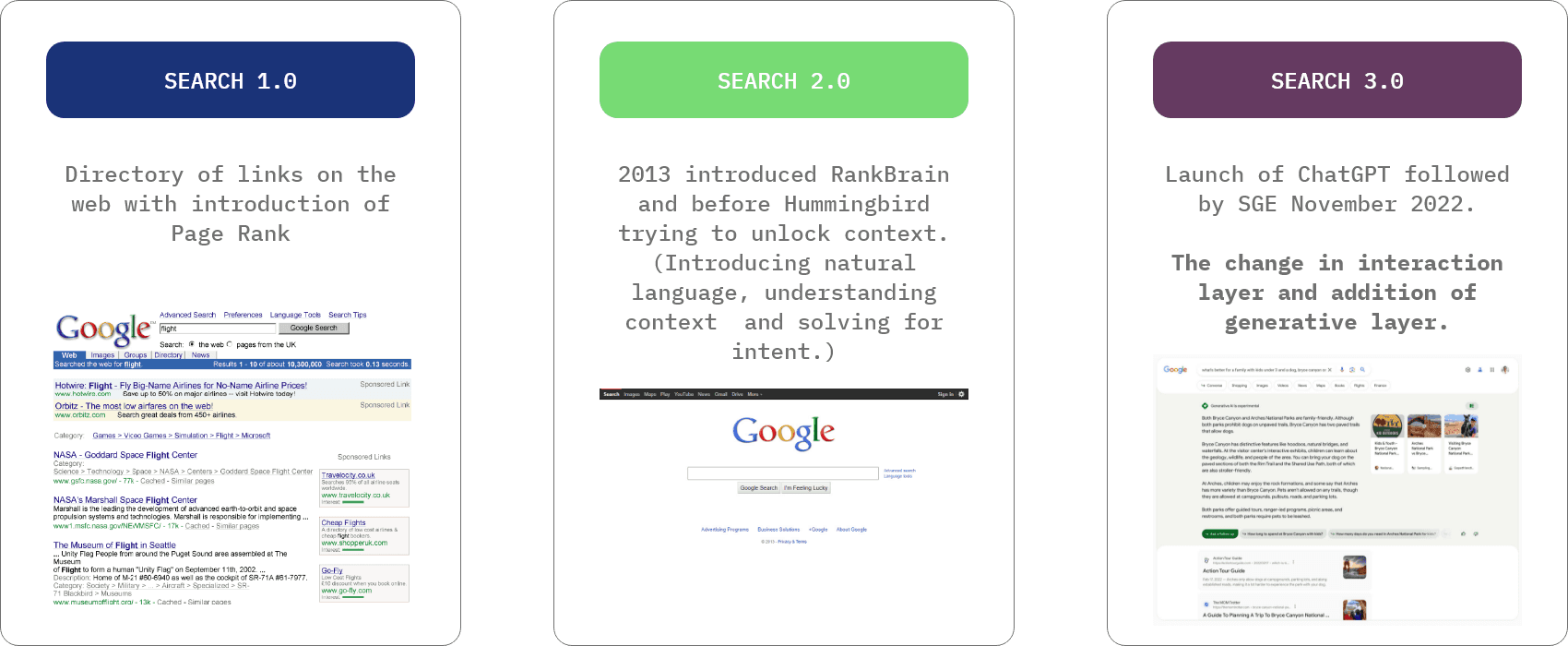Navigating Google AI: How It’s Transforming SEO and Organic Traffic
Navigating Google AI: How It’s Transforming SEO and Organic Traffic
Navigating Google AI: How It’s Transforming SEO and Organic Traffic
Navigating Google AI: How It’s Transforming SEO and Organic Traffic
Google’s advancements in artificial intelligence have forever reshaped SEO and organic traffic.
Google’s advancements in artificial intelligence have forever reshaped SEO and organic traffic.
Google’s advancements in artificial intelligence have forever reshaped SEO and organic traffic.
Google’s advancements in artificial intelligence have forever reshaped SEO and organic traffic.

Danny Sapio
SEO
SEO
August 6, 2024
August 6, 2024
10
10
min read
min read

Google’s advancements in artificial intelligence (AI) have fundamentally reshaped the landscape of SEO and organic traffic. With the integration of AI technologies into its search engine, particularly through the Search Generative Experience (SGE), Google has revolutionized the way users interact with search results. As AI continues to evolve—especially with competitors like Bing also launching their own AI-driven search overviews—its impact on SEO strategies is becoming increasingly critical. Marketers must stay informed and adapt to maintain and grow their organic search presence in this rapidly changing environment.

What is Google AI Overview?
Google AI is a suite of machine learning and artificial intelligence technologies developed to enhance the company’s products and services. At its core, Google AI leverages advanced models such as BERT and RankBrain to analyze and interpret vast amounts of data, improving user experiences by delivering more accurate and relevant search results.
RankBrain, introduced in 2015, was Google’s first AI-driven search component. It interprets the intent behind search queries by analyzing previous searches, helping deliver relevant results even when keywords don’t precisely match. BERT, another AI model, enhances Google’s ability to understand natural language by considering the context of words within a query, improving the interpretation of complex or conversational searches.
Understanding the Impact of Google AI Summaries on Organic Traffic
Google’s AI-powered SGE will have a profound impact on organic traffic. By providing users with AI-generated summaries directly in search results, SGE reduces the need for users to click through to websites for information, effectively increasing the prevalence of zero-click searches. This shift could significantly decrease organic traffic for many sites, as users may find sufficient answers directly within the search engine results pages (SERPs).
For certain types of content, particularly those centered around informational queries, the implementation of SGE could lead to substantial traffic drops. Risk assessments suggest that websites heavily reliant on organic search traffic could see declines ranging from 25% to 50%, especially for queries where users typically seek quick answers.
For example, a search for “OOH marketing” might now generate a comprehensive AI summary, negating the need for users to visit a specific website. This trend underscores the importance of adapting SEO strategies to address the changing search landscape.
According to Aleyda Solis’s research, there are three main types of SGE snapshots that can affect ranked pages differently:
Direct Answer Snapshots: These provide straightforward answers to user queries. Websites that once relied on high traffic from these queries could see traffic drop by up to 50%, as Google’s AI now delivers answers directly in the SERPs.
Exploration Snapshots: These offer users multiple perspectives on a topic, potentially reducing click-through rates by 30-40%, as users receive diverse answers directly within the search results. These snapshots typically highlight relevant and authoritative content, such as blog articles and tutorials.
Deep Dive Snapshots: These provide in-depth coverage of a topic, potentially reducing organic traffic by 25-35%, as users may not need to navigate to other pages after consuming the provided information. Content like research papers, expert opinions, and detailed blog articles fall into this category.
How Ranking Factors Have Changed with the Introduction of Google AI
The introduction of Google AI has shifted the focus of ranking factors, placing more emphasis on content relevance, context, and user intent over traditional SEO practices like keyword optimization and backlink quality. Google’s AI models, such as BERT and RankBrain, understand context and semantics more effectively than previous algorithms, making the quality and depth of content more critical than simply matching keywords.
A significant shift driven by Google AI is the rise of zero-click experiences, where users find the information they need directly in the search results without visiting a website. AI’s ability to generate concise and comprehensive answers within the SERPs has increased the prevalence of these experiences. As a result, businesses must adapt their SEO strategies to focus on visibility and value, even when user engagement doesn’t always translate into website visits.
How Google AI Influences SEO Practices + Actionable Steps
Keyword Optimization: With AI advancements, keyword optimization is evolving. Traditional keyword-stuffing strategies are becoming less effective. Instead, content must naturally incorporate keywords in a meaningful context. AI algorithms prioritize content that comprehensively and contextually answers user queries rather than simply matching keywords.
Actionable Steps:
Focus on researching topics related to your general query, using social platforms like TikTok or Quora to find relevant user interests.
Encourage content writers to concentrate on answering questions rather than stuffing keywords.
Add keywords naturally after the draft is written, ensuring the content maintains a human and conversational tone.
Content Quality: Content quality is more critical than ever. Google AI favors well-structured, informative, and authoritative content that provides in-depth analysis and clear answers. High-quality content creation is essential to maintain visibility in search results.
Actionable Steps:
Go beyond improving top-ranking content with the “skyscraper” technique. Instead, offer unique insights and thought leadership.
Incorporate quotes from internal or external experts to add depth and authority to your content.
Invest in thorough research to differentiate your content from competitors.
User Experience (UX): User experience is increasingly significant in SEO, as Google AI evaluates how users interact with content. Factors such as page load speed, mobile-friendliness, and overall site usability are crucial for ranking. AI also considers user engagement metrics like bounce rate and time on page to assess the quality of the user experience.
Actionable Steps:
Create content that reads naturally and doesn’t feel like it was generated by AI.
Use tools like Hotjar and Microsoft Clarity to monitor how users engage with specific pages, and use this data to refine your content optimization efforts.
Zero-Click Experiences: The rise of zero-click searches, driven by AI’s ability to generate instant answers, requires businesses to rethink their SEO strategies. Instead of focusing solely on driving traffic to websites, businesses need to ensure their content is visible and authoritative enough to be featured directly in the search results.
Actionable Steps:
Optimize for featured snippets, knowledge panels, and other rich results that AI populates with direct answers.
Focus on creating content that delivers immediate value and establishes your brand as a trusted source of information.
Google’s AI-driven evolution of search is changing the SEO game. By staying informed and adapting your strategies, you can ensure your content remains competitive in this AI-powered search landscape.
Google’s advancements in artificial intelligence (AI) have fundamentally reshaped the landscape of SEO and organic traffic. With the integration of AI technologies into its search engine, particularly through the Search Generative Experience (SGE), Google has revolutionized the way users interact with search results. As AI continues to evolve—especially with competitors like Bing also launching their own AI-driven search overviews—its impact on SEO strategies is becoming increasingly critical. Marketers must stay informed and adapt to maintain and grow their organic search presence in this rapidly changing environment.

What is Google AI Overview?
Google AI is a suite of machine learning and artificial intelligence technologies developed to enhance the company’s products and services. At its core, Google AI leverages advanced models such as BERT and RankBrain to analyze and interpret vast amounts of data, improving user experiences by delivering more accurate and relevant search results.
RankBrain, introduced in 2015, was Google’s first AI-driven search component. It interprets the intent behind search queries by analyzing previous searches, helping deliver relevant results even when keywords don’t precisely match. BERT, another AI model, enhances Google’s ability to understand natural language by considering the context of words within a query, improving the interpretation of complex or conversational searches.
Understanding the Impact of Google AI Summaries on Organic Traffic
Google’s AI-powered SGE will have a profound impact on organic traffic. By providing users with AI-generated summaries directly in search results, SGE reduces the need for users to click through to websites for information, effectively increasing the prevalence of zero-click searches. This shift could significantly decrease organic traffic for many sites, as users may find sufficient answers directly within the search engine results pages (SERPs).
For certain types of content, particularly those centered around informational queries, the implementation of SGE could lead to substantial traffic drops. Risk assessments suggest that websites heavily reliant on organic search traffic could see declines ranging from 25% to 50%, especially for queries where users typically seek quick answers.
For example, a search for “OOH marketing” might now generate a comprehensive AI summary, negating the need for users to visit a specific website. This trend underscores the importance of adapting SEO strategies to address the changing search landscape.
According to Aleyda Solis’s research, there are three main types of SGE snapshots that can affect ranked pages differently:
Direct Answer Snapshots: These provide straightforward answers to user queries. Websites that once relied on high traffic from these queries could see traffic drop by up to 50%, as Google’s AI now delivers answers directly in the SERPs.
Exploration Snapshots: These offer users multiple perspectives on a topic, potentially reducing click-through rates by 30-40%, as users receive diverse answers directly within the search results. These snapshots typically highlight relevant and authoritative content, such as blog articles and tutorials.
Deep Dive Snapshots: These provide in-depth coverage of a topic, potentially reducing organic traffic by 25-35%, as users may not need to navigate to other pages after consuming the provided information. Content like research papers, expert opinions, and detailed blog articles fall into this category.
How Ranking Factors Have Changed with the Introduction of Google AI
The introduction of Google AI has shifted the focus of ranking factors, placing more emphasis on content relevance, context, and user intent over traditional SEO practices like keyword optimization and backlink quality. Google’s AI models, such as BERT and RankBrain, understand context and semantics more effectively than previous algorithms, making the quality and depth of content more critical than simply matching keywords.
A significant shift driven by Google AI is the rise of zero-click experiences, where users find the information they need directly in the search results without visiting a website. AI’s ability to generate concise and comprehensive answers within the SERPs has increased the prevalence of these experiences. As a result, businesses must adapt their SEO strategies to focus on visibility and value, even when user engagement doesn’t always translate into website visits.
How Google AI Influences SEO Practices + Actionable Steps
Keyword Optimization: With AI advancements, keyword optimization is evolving. Traditional keyword-stuffing strategies are becoming less effective. Instead, content must naturally incorporate keywords in a meaningful context. AI algorithms prioritize content that comprehensively and contextually answers user queries rather than simply matching keywords.
Actionable Steps:
Focus on researching topics related to your general query, using social platforms like TikTok or Quora to find relevant user interests.
Encourage content writers to concentrate on answering questions rather than stuffing keywords.
Add keywords naturally after the draft is written, ensuring the content maintains a human and conversational tone.
Content Quality: Content quality is more critical than ever. Google AI favors well-structured, informative, and authoritative content that provides in-depth analysis and clear answers. High-quality content creation is essential to maintain visibility in search results.
Actionable Steps:
Go beyond improving top-ranking content with the “skyscraper” technique. Instead, offer unique insights and thought leadership.
Incorporate quotes from internal or external experts to add depth and authority to your content.
Invest in thorough research to differentiate your content from competitors.
User Experience (UX): User experience is increasingly significant in SEO, as Google AI evaluates how users interact with content. Factors such as page load speed, mobile-friendliness, and overall site usability are crucial for ranking. AI also considers user engagement metrics like bounce rate and time on page to assess the quality of the user experience.
Actionable Steps:
Create content that reads naturally and doesn’t feel like it was generated by AI.
Use tools like Hotjar and Microsoft Clarity to monitor how users engage with specific pages, and use this data to refine your content optimization efforts.
Zero-Click Experiences: The rise of zero-click searches, driven by AI’s ability to generate instant answers, requires businesses to rethink their SEO strategies. Instead of focusing solely on driving traffic to websites, businesses need to ensure their content is visible and authoritative enough to be featured directly in the search results.
Actionable Steps:
Optimize for featured snippets, knowledge panels, and other rich results that AI populates with direct answers.
Focus on creating content that delivers immediate value and establishes your brand as a trusted source of information.
Google’s AI-driven evolution of search is changing the SEO game. By staying informed and adapting your strategies, you can ensure your content remains competitive in this AI-powered search landscape.

Written by
Danny Sapio
When not hard at work, Danny can be found enjoying the outdoors, seeing live music, and exercising. Danny is passionate about data-informed decisions and strongly believes in implementing cohesive measurement frameworks to ensure all media is accountable for driving business outcomes. Throughout his career, he has developed full-funnel media strategies to drive both Brand Awareness and Growth objectives. He also loves ideating and activating first-to-market opportunities for clients to help brands stay innovative and at the forefront of their vertical.
More articles by
Danny Sapio
You might also like…
+91 6366 298 298
+91 6366 298 298
+91 6366 298 298
+91 6366 298 298
+91 6366 298 298






